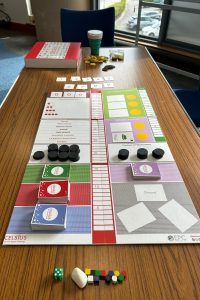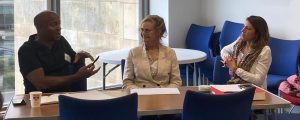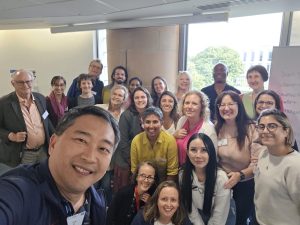Michelle Rodrigue & Shona Russell
In late August, CSEAR members gathered at the University of St Andrews Business School for the eighth ECoP event, a workshop on ‘Innovative pedagogical practices to embed sustainability in the accounting curriculum’. This year’s workshop, held before the annual International Congress on Social and Environmental Accounting Research, aimed to offer participants an opportunity to experience different pedagogies, specifically
Celsius – The 2 Degree Challenge – The game, developed by Fernanda Carreira, Fabiano Onça and colleagues at the Center for Sustainability Studies, aims to increase participants’ awareness of climate change, illustrating business measures of mitigation and adaptation as well as the importance of collaboration amongst stakeholders across the private and public sector.

Celsius – The 2 Degree Challenge (Photo credit Fernanda Carreira)
Workshop participants played the game either in-person or via the online version, facilitated by Fernanda or Fabiano respectively. As players, participants act as CEOs tasked with creating value for their companies/shareholders. In doing so, they either reduce or increase carbon emissions and can also choose advocacy to influence government policy concerning carbon emissions. Throughout the game the, amount of carbon emissions is continuously calculated based on the decisions taken by the CEOs. The game ends when either the temperature increase reaches 2°C whereby everyone loses; or when carbon emissions are sufficiently reduced whereby the player with the greatest value creation wins. Key to learning, once the game ends, participants are invited to reflect on their experiences, taking into account not only the impact of their decisions on carbon emissions, but also the (lack of) collaboration which occurred during the game.
Improvised role play – In this activity, participants in groups of three were tasked with negotiating a commercial deal for the purchase of concrete for an oil rig. During three iterations, participants were asked to subsequently play the role of safety engineer, financial decision-maker and seller over a 90-minutes period. After each iteration, they were invited to reflect on their individual and shared experience in order to allow sufficient time and space for each role (and scene) experience to sink in. Following the completion of the activity, the participants were informed that this commercial deal has led to the Deepwater Horizon disaster. This news served as a springboard for discussing how the speakers incorporated this activity into discussion of professional ethics and the implications of accounting decisions. The speakers also provided an overview of the follow-up role play activity they perform with the students, set after the explosion of the oil rig.
Towards the end of the day, participants were invited to reflect on their experiences with the pedagogies with the group and ask questions to the speakers. This was also an opportunity for the speakers to share their experiences of using these pedagogies in their respective institutions. Discussion revolved around the nature and process of inclusion of the pedagogical activities into modules or programmes and the institutional issues to be mindful of and to address when contemplating their use, as well as students’ responses to the activities.

Speakers reflect on their experiences (Photo Credit: Shona Russell)
Taken together, it seems these immersive experiences combined with the concluding plenary discussions enriched conversations and helped to strengthen connections between participants, some of whom were returning participant, having also participated to the 2023 ECoP workshop. Huge thanks to all speakers and participants for making the workshop an enriching experience. As usual, the material curated from this ECoP event is available in the CSEAR Members’ area. Thanks, as ever, to speakers for generously sharing them with CSEAR members.

ECoP 8 Participants (Photo Credit: Charles Cho)
